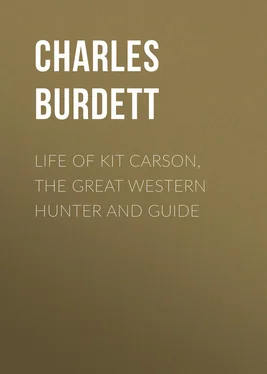Charles Burdett - Life of Kit Carson, the Great Western Hunter and Guide
Здесь есть возможность читать онлайн «Charles Burdett - Life of Kit Carson, the Great Western Hunter and Guide» — ознакомительный отрывок электронной книги совершенно бесплатно, а после прочтения отрывка купить полную версию. В некоторых случаях можно слушать аудио, скачать через торрент в формате fb2 и присутствует краткое содержание. Жанр: foreign_antique, foreign_prose, на английском языке. Описание произведения, (предисловие) а так же отзывы посетителей доступны на портале библиотеки ЛибКат.
- Название:Life of Kit Carson, the Great Western Hunter and Guide
- Автор:
- Жанр:
- Год:неизвестен
- ISBN:нет данных
- Рейтинг книги:3 / 5. Голосов: 1
-
Избранное:Добавить в избранное
- Отзывы:
-
Ваша оценка:
- 60
- 1
- 2
- 3
- 4
- 5
Life of Kit Carson, the Great Western Hunter and Guide: краткое содержание, описание и аннотация
Предлагаем к чтению аннотацию, описание, краткое содержание или предисловие (зависит от того, что написал сам автор книги «Life of Kit Carson, the Great Western Hunter and Guide»). Если вы не нашли необходимую информацию о книге — напишите в комментариях, мы постараемся отыскать её.
Life of Kit Carson, the Great Western Hunter and Guide — читать онлайн ознакомительный отрывок
Ниже представлен текст книги, разбитый по страницам. Система сохранения места последней прочитанной страницы, позволяет с удобством читать онлайн бесплатно книгу «Life of Kit Carson, the Great Western Hunter and Guide», без необходимости каждый раз заново искать на чём Вы остановились. Поставьте закладку, и сможете в любой момент перейти на страницу, на которой закончили чтение.
Интервал:
Закладка:
"In every sense of the word, then, these monks were practically the sovereign rulers of California – passing laws affecting not only property, but even life and death – declaring peace and war against their Indian neighbors – regulating, receiving, and spending the finances at discretion – and, in addition, drawing large annual subsidies not only from the pious among the faithful over all Christendom, but even from the Spanish monarchy itself, almost as a tribute to their being a superior state. This surely was the golden age of the missions – a contented, peaceful, believing people, abundant wealth for all their wants, despotic will, and no responsibility but to their own consciences and heaven! Their horn was filled to overflowing; but soon an invisible and merciless hand seized it, and slowly and lingeringly, as if in malicious sport, turned it over, and spilled the nectar of their life upon the wastes of mankind, from whence it can never again be collected. The golden age of another race has now dawned, and with it the real prosperity of the country.
"The missions were originally formed on the same general plan, and they were planted at such distances from each other as to allow abundant room for subsequent development. They were either established on the sea-coast, or a few miles inland. Twenty or thirty miles indeed seems all the distance the missionaries had proceeded into the interior; beyond which narrow belt the country was unexplored and unknown. Each mission had a considerable piece of the best land in the neighborhood set aside for its agricultural and pastoral purposes, which was commonly about fifteen miles square. But besides this selected territory, there was generally much more vacant land lying between the boundaries of the missions, and which, as the increase of their stocks required more space for grazing, was gradually occupied by the flocks and herds of the Fathers, nearest to whose mission lay the previously unoccupied district. Over these bounds the Fathers conducted all the operations of a gigantic farm. Their cattle generally numbered from ten thousand to twenty thousand and their sheep were nearly as numerous – though some missions had upwards of thrice these numbers – which fed over perhaps a hundred thousand acres of fertile land.
"Near the centre of such farms were placed the mission buildings. These consisted of the church – which was either built of stone, if that material could be procured in the vicinity, or of adobes , which are bricks dried in the sun; and was as substantial, large, and richly decorated an erection as the means of the mission would permit, or the skill and strength of their servants could construct. In the interior, pictures and hangings decorated the walls; while the altars were ornamented with marble pillars of various colors, and upon and near them stood various articles of massy gold and silver plate. A profusion of gilding and tawdry sparkling objects caught and pleased the eye of the simple congregations. Around, or beside the church, and often in the form of a square, were grouped the habitations of the Fathers and their household servants, and the various granaries and workshops of the people; while, at the distance of one or two hundred yards, stood the huts of the Indians. The former buildings were constructed of adobes , and covered with brick tiles, frail and miserable materials at the best. The huts of the Indians were occasionally made of the same materials, but more commonly were formed only of a few rough poles, stuck in the ground, with the points bending towards the centre like a cone, and were covered with reeds and grass. An adobe wall of considerable height sometimes inclosed the whole village. The direction of the affairs of the settlement was in the hands of one of the Fathers, originally called a president, but afterwards a prefect ; and each prefect was independent in his own mission, and practically supreme in all its temporal, and nearly in all its spiritual matters, to any human authority.
"Thus the Fathers might be considered to have lived something in the style of the patriarchs of the days of Job and Abraham. They indeed were generally ignorant and unlettered men, knowing little more than the mechanical rites of their church, and what else their manuals of devotion and the treasuries of the lives of the saints taught them; but they seem to have been personally devout, self-denying, and beneficent in their own simple way. They thought they did God service, and perhaps much more the Indians themselves, in catching, taming, and converting them to Christianity. That was their vocation in the world, and they faithfully obeyed its calls of duty. Towards the converts and actually domesticated servants, they always showed such an affectionate kindness as a father pays to the youngest and most helpless of his family. The herds and flocks of the Fathers roamed undisturbed over numberless hills and valleys. Their servants or slaves were true born children of the house, who laboured lightly and pleasantly, and had no sense of freedom nor desire for change. A rude but bounteous hospitality marked the master's reception of the solitary wayfarer, as he traveled from mission to mission, perhaps bearing some scanty news from the outer world, all the more welcome that the Fathers knew little of the subject, and could not be affected by the events and dangers of distant societies. All these things have now passed away. The churches have fallen into decay, deserted by the old worshipers, and poverty-stricken; the adobe houses of the Fathers are in ruins – and there is scarcely any trace left of the slightly erected huts of the Indians, who themselves have deserted their old hearths and altars, and are silently, though rapidly, disappearing from the land. But the memory of the patriarchal times, for they were only as yesterday, still remains fresh in the minds of the early white settlers."
Mr. Young's party did not remain long to enjoy the sumptuous fare at the Mission of San Gabriel; but pushed on to that of San Fernando, and thence to the river and fertile valley of Sacramento. In this neighborhood they trapped for beaver, and Carson displayed his activity and skill as a hunter of deer, elk, and antelope.
CHAPTER IV
Only familiarity with one of like character, by actually seeing it, can give a just idea of the country through which they were traveling. Livingston's descriptions of localities in Central Africa might be transferred to our pages verbatim , to give a word-painting of the desiccated deserts of what is now New Mexico and Arizona. Carson's curiosity, as well as care to preserve the knowledge for future use, led him to note in memory, every feature of the wild landscape, its mountain chains, its desert prairies, with only clumps of the poor artemisia for vegetation, its rivers, and the oases upon their banks, where there were bottom-lands – nor were beaver found elsewhere – with its river beds whose streams had found a passage beneath the surface of the earth, and each other general feature that would attract the eye of the natural, rather than the scientific observer.
In our day, the note book of the pioneer furnishing the data, the traveler carries a guide-book to direct his course from point to point, upon a well trodden road, to those places where grass and water will furnish refreshment for his animals, while he regales himself, not upon the spare-rib of a starved mule, killed because it could go no longer, but upon a variety of good things from the well stocked larder of the pouches of the saddle-bags his pack mule carries, or the provision box of his wagon. Or, instead of the meat-diet of the trapper, when he has been in luck in a fertile locality, the traveler – not trapper – of to-day, perhaps has shot a prairie chicken, and prepares his dinner by making a stew of it, which he consumes with hard bread he has purchased at a station not ten miles away.
Читать дальшеИнтервал:
Закладка:
Похожие книги на «Life of Kit Carson, the Great Western Hunter and Guide»
Представляем Вашему вниманию похожие книги на «Life of Kit Carson, the Great Western Hunter and Guide» списком для выбора. Мы отобрали схожую по названию и смыслу литературу в надежде предоставить читателям больше вариантов отыскать новые, интересные, ещё непрочитанные произведения.
Обсуждение, отзывы о книге «Life of Kit Carson, the Great Western Hunter and Guide» и просто собственные мнения читателей. Оставьте ваши комментарии, напишите, что Вы думаете о произведении, его смысле или главных героях. Укажите что конкретно понравилось, а что нет, и почему Вы так считаете.












